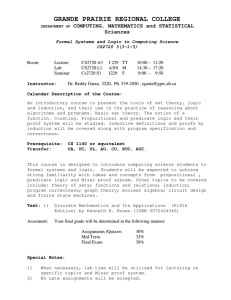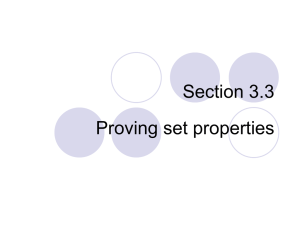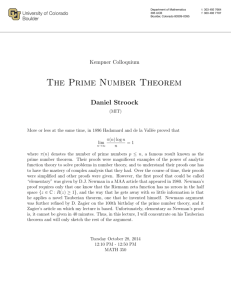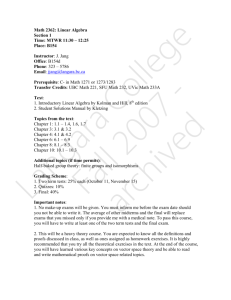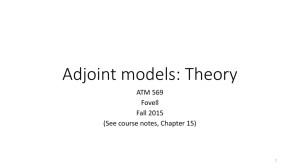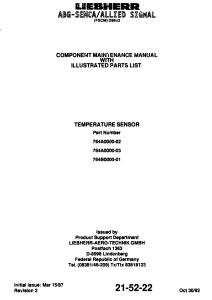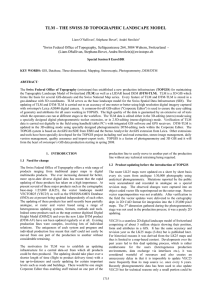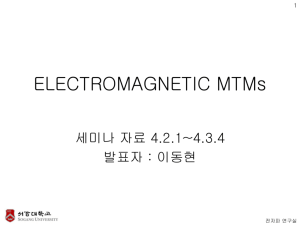Syllabus: Tom Donaldson's 'Introduction to Logic', Fall 2011 Basic
advertisement
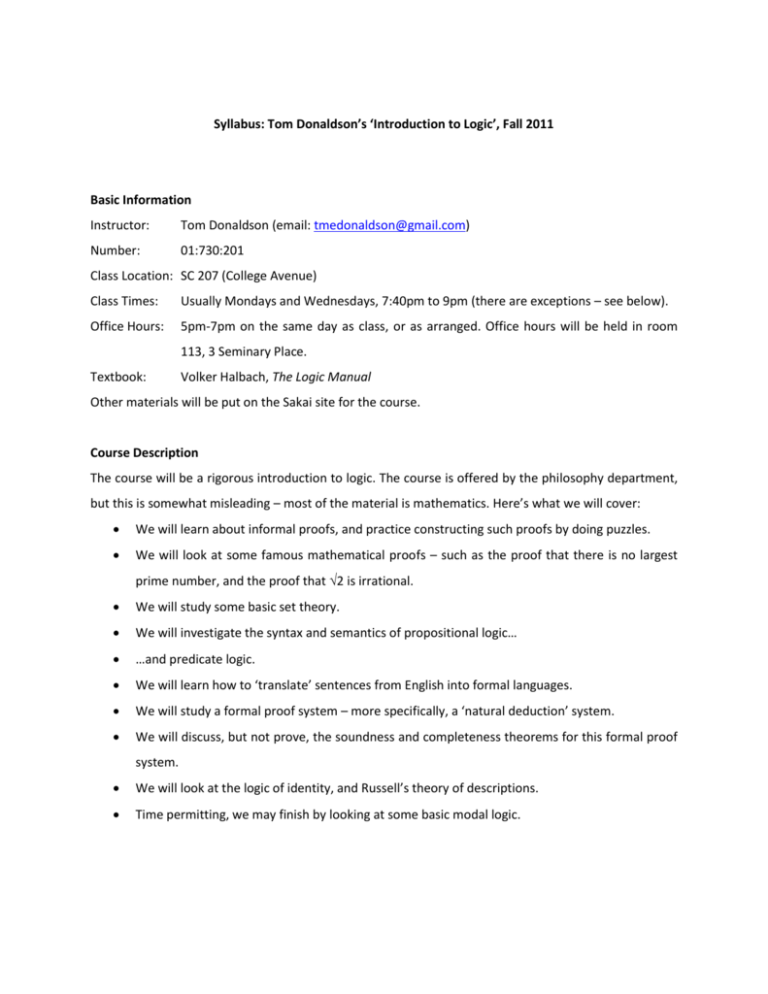
Syllabus: Tom Donaldson’s ‘Introduction to Logic’, Fall 2011 Basic Information Instructor: Tom Donaldson (email: tmedonaldson@gmail.com) Number: 01:730:201 Class Location: SC 207 (College Avenue) Class Times: Usually Mondays and Wednesdays, 7:40pm to 9pm (there are exceptions – see below). Office Hours: 5pm-7pm on the same day as class, or as arranged. Office hours will be held in room 113, 3 Seminary Place. Textbook: Volker Halbach, The Logic Manual Other materials will be put on the Sakai site for the course. Course Description The course will be a rigorous introduction to logic. The course is offered by the philosophy department, but this is somewhat misleading – most of the material is mathematics. Here’s what we will cover: We will learn about informal proofs, and practice constructing such proofs by doing puzzles. We will look at some famous mathematical proofs – such as the proof that there is no largest prime number, and the proof that 2 is irrational. We will study some basic set theory. We will investigate the syntax and semantics of propositional logic… …and predicate logic. We will learn how to ‘translate’ sentences from English into formal languages. We will study a formal proof system – more specifically, a ‘natural deduction’ system. We will discuss, but not prove, the soundness and completeness theorems for this formal proof system. We will look at the logic of identity, and Russell’s theory of descriptions. Time permitting, we may finish by looking at some basic modal logic. Course Goals Philosophers regularly appeal to logic in their work. Without some understanding of basic logic, it is impossible to understand much recent work in philosophy. Having completed this course, students will be able to understand much of the logic used in contemporary philosophy. Students who study subjects in which proofs are used – mathematics, philosophy, computer science, physics, economics – will be better able to construct and understand proofs, and better able to identify errors in putative proofs. Students will gain a better understanding of how natural languages work. They will learn to identify structural ambiguities in sentences of natural languages. Having completed the course, students will be less prone to certain sorts of error in reasoning. They will for example be less likely to confuse ‘All Fs are Gs’ with ‘All Gs are Fs’, and less likely to commit the quantifier shift fallacy. Logic is a fascinating a rewarding subject in its own right. I hope that at least once in the course, each student will look at a clever proof, and smile. List of Classes Week 1: Sep 7, 8 Week 2: Sep 12, 14 Week 3: Sep 19, 21 Week 4: Sep 26, 28 Week 5: Oct 3, 5 Week 6: Oct 10, 12 Week 7: Oct 17, 19 Week 8: Oct 24, 26 Week 9: Oct 31, Nov 2 Week 10: Nov 7, 9 Week 11: Nov 14, 16 Week 12: Nov 21 Week 13: Nov 28, 30 Week 14: Dec 5, 7 Week 15: Dec 12 (NB: This week there is a Thursday class instead of a Monday class) (NB: No class on Wednesday – it’s Thanksgiving.) List of Topics Topic Number 0 1 2 3 4 5 6 7 8 9 Topic Informal Proof Sets, Relations and Arguments Syntax and Semantics of Propositional Logic Formalization in Propositional Logic The Syntax of Predicate Logic The Semantics of Predicate Logic Natural Deduction Formalization in Predicate Logic Identity and Definite Descriptions Basic Modal Logic Reading None TLM ch. 1 TLM ch. 2 TLM ch. 3 TLM ch. 4 TLM ch. 5 TLM ch. 6 TLM ch. 7 TLM ch. 8 I’ll write something for this topic, which I’ll distribute in good time. Assessment There will be an in-class exam after topics 2, 4, 6 and 9, each of which will take up one class. These will be closed book exams, and collaboration will not be permitted. Each student’s final grade will be determined entirely by their scores on these exams (and their attendance record). Each student will be given a ‘raw score’ for each exam, as a fraction. These scores will then be converted to a ‘cooked score’ on the following four-point scale: A Outstanding B+ B 4.0 3.5 Good C+ 3.0 2.5 C Satisfactory 2.0 D Poor 1.0 F Failing 0.0 The function used to convert raw scores to cooked scores will vary from exam to exam. I may award scores in excess of 4.0. To calculate each student’s final grade, I will begin by calculating the mean of their cooked scores for the assessments. If necessary, I will then remove points for unexcused absences (see below). Finally, I will round the score to the nearest half point – rounding up if the score is a multiple of 0.25 – and give the student the appropriate letter grade. I will be completely strict about this rounding process: if a student’s score is 3.24 I will round it down to 3.0 and give the student a B. This is non-negotiable. I will not reply to emails that say ‘…but I was only 0.01 away from a B+…’. Attendance Students are expected to attend all classes; if you expect to miss one or two classes, please use the University absence reporting website https://sims.rutgers.edu/ssra/ to indicate the date and reason for your absence. An email is automatically sent to me. My attendance policy is as follows. Each student will be allowed up to three unexcused absences, without penalty. For every unexcused absence after the third, the student will lose a tenth of a point from their final score (see ‘Assessment’, above). Each student should come to office hours at least once in the semester. There is a penalty of a tenth of a point for failing to do this. If a student misses one of the exams, he or should contact me to arrange a make-up exam. Problem Sheets I will produce a problem sheet for each topic. These are obligatory, but not graded. I encourage students to work on these in groups. Once the students have had sufficient time to work on a problem sheet, I will put an answer sheet up on Sakai. I will be happy to help students with their work on these sheets; I will also be happy to help students understand the answer sheets. The questions on the exam will be similar to those on the problem sheets – so students who skip the problem sheets will very likely get low grades. Disability Accommodation Students with disabilities who consequently require special accommodations should contact me. Students who have questions about the university's accommodation policies should refer to the Rutgers Office of Disability Services, at http://disabilityservices.rutgers.edu/ Classroom Conduct Laptops will not be permitted in class. Students may not use mobile phones, except with prior permission from me. An atmosphere of jovial conviviality is expected and required.
